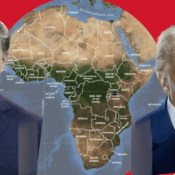
The World Bank warns of the slowest global growth since 2008 and reduces its forecast for global growth to 2.3%
The World Bank has lowered its prediction for global growth in 2025 to 2.3%, citing trade tensions brought on President Trump’s trade tariffs.
The World Bank has stated that, barring complete worldwide recessions, trade tensions brought on by US President Donald Trump and policy uncertainty are predicted to cause global growth to decline to its lowest level since 2008.
The volatility has caused growth predictions to be reduced in about 70% of all economies—across all regions and income categories, according to the World Bank’s most recent Global Economic Prospects report.
According to the research, the bank’s prediction for worldwide growth this year was off by 0.4 percentage points. The global economy is now predicted to grow by just 2.3% in 2025, compared to 2.8% in 2024.
Compared to the rate that was anticipated at the beginning of the year, the anticipated drop to 2.3% is almost half a percentage point lower.
At 3.6% in 2025, 3.7% in 2026, and 3.8% in 2027, the bank’s April 2025 growth forecast for the Nigerian economy was maintained.
The economy of Sub-Saharan Africa, which is similarly impacted by global spillovers, is expected to grow by 3.7% in 2025 and 4.2% on average in 2026 as a result of increased uncertainty and possible unfavorable changes in trade policy.
Despite the fact that the analysis does not predict a worldwide recession, if projections for the next two years come to pass, average global growth for the first seven years of the 2020s will be the slowest since the 1960s.
The developing world is becoming into a development-free zone outside of Asia, according to Indermit Gill, Senior Vice President for Development Economics and Chief Economist for the World Bank Group.
It has been promoting itself for over ten years. Over the past three decades, the growth rate in developing countries has decreased, from 6% per year in the 2000s to 5% in the 2010s to less than 4% in the 2020s. This reflects the decline in global trade growth, which dropped from an average of 5% in the 2000s to roughly 4.5 percent in the 2010s and less than 3 percent in the 2020s. The increase of investments has also slowed, while debt has reached all-time highs.
Nearly 60% of developing economies are predicted to see slower growth this year, with average growth of 3.8% in 2025 and a slight increase to 3.9% in 2026 and 2027.
The 2010s average is more than a percentage point higher than that. It is projected that low-income nations would expand 5.3% this year, which is 0.4 percentage points less than what was predicted at the beginning of 2025. Global inflation, which is expected to average 2.9% in 2025, is nevertheless higher than it was before to the pandemic due to the pressures of tight labor markets and tariff rises.
Growth slowdowns will make it more difficult for emerging nations to create jobs, alleviate extreme poverty, and catch up to developed nations in terms of per capita income.
In 2025, developing economies’ per capita income growth is expected to be 2.9 percent, which is 1.1 percentage points less than the average for the years 2000–2019.
By seeking strategic trade and investment alliances with other economies and diversifying trade, especially through regional accords, the research said that developing economies should aim for broader liberalization in the face of growing trade barriers.
It called on policymakers to prioritize fiscal spending for the most vulnerable households, mobilize domestic revenues, and enhance fiscal frameworks in light of decreasing government resources and growing development demands.
In order to boost economic growth, it urged nations to enhance business environments and encourage productive employment by giving workers the skills they need and establishing the frameworks that allow labor markets to effectively connect workers and businesses. In order to support the most vulnerable emerging economies, international cooperation will be essential. This includes multilateral interventions, concessional finance, and emergency relief and support for nations involved in ongoing wars, the research continued.
All Categories
Recent Posts
Tags
+13162306000
zoneyetu@yahoo.com



